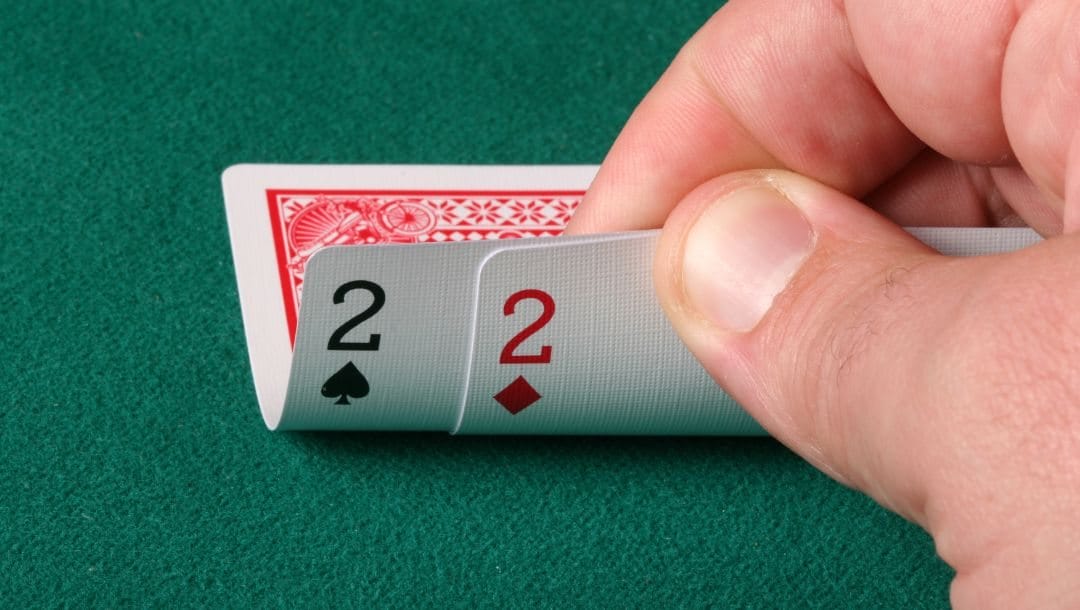
In poker, information is gold. The game runs on the energy that players invest in interpreting limited information as best they can to develop winning strategies. It’s similar to many other limited-information activities, from financial speculation to military campaigns. Poker players are so hungry for information that they take it from wherever they can. The cards are one source of information, but the behavior of other players is arguably more important.
The information that players can glean from each other is multi-faceted. In online poker, betting frequencies are all important, while body language plays a critical role in live poker. And this is where poker tells come in. These are the subconscious gestures players make, which very often reveal the truth about their hand strength and provide clues as to their likely intentions in the process. Unless they’re bluffing, of course. One frequently discussed tell is double-checking your hole cards. It’s such a common gesture that we decided to look into it and report back on what we found.
What It Means To Double-Check Your Cards

What are hole cards in poker? They’re the cards you’re dealt at the beginning of the game that determine your game plan and betting strategy. These cards represent the initial information on which all future decisions depend. They’re the only cards players can see in the preflop betting round, when the bets that will often determine the game’s outcome are made. Inexperienced players will attempt to play their own hand, but the hand you should really be playing is your opponent’s. One way to do that is to put them on a range, in line with modern poker theory. Another is to recognize and take advantage of poker tells, such as when an opponent double-checks their hole cards.
This gesture belongs to the category of so-called ostentatious behaviors. Unprompted talking, unprompted laughing, smiling for no reason, reaching for chips out of turn, staring aggressively, slamming chips down on the cards — these attention-grabbing gestures are all potentially meaningful. According to poker psychologist Zachary Elwood, ostentatious gestures in the early stages of a hand signal hand weakness. Imagine a player who calls a raise before the flop, sees it, looks at their cards, looks again and checks. Conversely, strong-handed players won’t keep checking their cards. A player who flops a monster will be reluctant to reveal their “treasure” by drawing attention to themselves.
On later streets, double-checking cards can mean something completely different. A player who bets big on the river might double-check their cards because they’re relaxed and confident that they have the best hand.
Putting Poker Tells to Good Use

Assuming that the double-checking behavior you’re witnessing isn’t a carefully crafted trap by a master bluffer, the information the tell provides can come in handy, especially before the flop. Say a player in early position raises and you’ve already noticed two players behind you (to your left at the table) staring repeatedly at their cards. Knowing that the players behind you are unlikely to call or raise, you can call or 3-bet with a wider range.
On the flop, a player who studies the community cards, then gazes at their hole cards probably hasn’t connected very strongly with the board — if they have anything at all.
These generalizations are only useful to a point. The most useful tells come from observing the patterns of individual players. Professional players tend to have very different body language from beginners. A novice who stares at their hole cards might just be trying to figure out what to do. By contrast, imagine an experienced player you regularly play with is in late position. You catch them staring momentarily at their cards, then the action comes to them and they open raise. Since you’ve observed this opponent’s patterns closely, you know that card staring is a useful tell for them, so you adjust your strategy accordingly. Maybe you call with a very strong hand, maybe you re-raise them light. Either way, your actions are informed by the knowledge that he’s holding something premium.
The takeaway here is that poker tells aren’t magic bullets that can win you the pot every time. In fact, relying on them too much or too often can get you into trouble. Feedback from poker forums shows that many players are skilled in reverse psychology, toying with their opponents’ minds by representing weakness instead of strength and vice-versa. Other players routinely stare at their cards, no matter how strong or weak they are, in order to conceal their true intention behind a smoke screen. Only through repeated observation can you determine whether a specific behavior pattern is a tell for a specific player. It’s a bit like science, come to think of it.
Play Better Poker at BetMGM
Whether you’re an experienced player or just starting out, you can improve your game when you register with BetMGM. That’s because our online poker community includes every kind of player, from beginner to pro. Lock horns with opponents at your level and hone your poker skills with cash games and poker tournaments available every day. Be the best you can be at BetMGM!
Improve your poker game with the use of psychology! Learn why the common poker tell of double-checking hole cards may reveal an opponent holding a weak hand.


